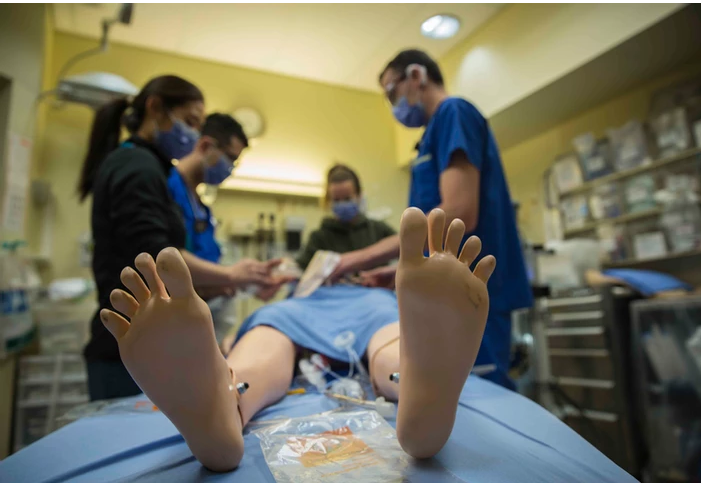Main Second Level Navigation
The Department’s Response to the Internal Medicine Residency Accreditation Review: Taking Action to Address Residents’ Concerns

The academic year 2020-21 has been challenging, but as a department we have met the challenges presented to us with humility and compassion. As we move forward to the next academic year, we must continue to do so. We must continue to grow and nurture a culture of caring and inclusion, despite external forces pushing us in other directions.
In this Chair’s Column, I would like to lay out for you our plan for addressing the concerns raised in the Royal College review regarding the environment in which we work and in which our residents and fellows learn.
As you know, in the first week of May 2021, the department received the Preliminary Accreditation Outcome for our residency training programs. Among these reports, the Royal College’s Accreditation Committee (AC) informed us of their decision to confer the status of “Accredited Program on Notice of Intent to Withdraw Accreditation”. The RCPSC issues such a notice when it finds “major and/or continuing non-compliance with one or more standards, which calls into question the educational environment and/or integrity of the program.”
As a result of this decision, the program will undergo an external review in November 2022 (the final report, when received, will be posted on the departmental website). Let me state clearly that the department leadership accepts this criticism and considers the report an urgent call to action.
The onus is on us to demonstrate why the accreditation should not be withdrawn.
Why did they make this decision?
While the reviewers’ lauded our IM Program Director, Jeannette Goguen and the IM Residency Program Committee (RPC) and staff administration, and highlighted many strengths of the program, they also identified some very concerning areas in need of improvement:
- There is an ongoing issue with resident supervision in the clinical environment, and perceived lack of support, particularly of junior learners on subspecialty services and on the Clinical Teaching Units, CTUs, during weekends. This is felt (by the residents) to be impacting patient safety; and,
- Residents are afraid to raise substantial questions or issues with the program, for fear of repercussions, both within their training program and related to future employment in Toronto. This perception arises from observation of the treatment of residents who have spoken out.
These issues go well beyond the jurisdiction of the IM program itself, and require a whole of department response.
Our Plan:
Unfortunately, the reviewers’ report provides insufficient specificity or detail to take action towards improving the weaknesses identified; we need to gather additional information. We need to better understand residents’ experiences in the program and garner their advice on ways to address the perception of lack of support within components of the program and the potential of repercussions for speaking out. To do so effectively, we must provide a safe, arms-length process for data collection. With this in mind, the Department is establishing the Internal Medicine Residency Program Accreditation Task Force (AC Task Force), which will be co-chaired by an IM resident and a Department of Medicine faculty member.
AC Task Force Co-Chairs
Faculty Co-Chair, AC Task Force
I am incredibly grateful to Dr. Kevin Imrie, Division of Hematology, Department of Medicine, for agreeing to serve as the Faculty Co-Chair, AC Task Force. Dr. Imrie is uniquely suited to this role given his many leadership experiences, including as former IM Program Director, DoM Vice Chair, Education, Associate Dean, PGME, Sunnybrook PIC and President of the Royal College. Dr. Imrie also led the pan-Canadian Resident Duty Hour and Fatigue Risk Management Task Forces. He is a skillful leader and ardent advocate for resident well-being.
Resident Co-Chair, AC Task Force
We are grateful to the resident members of the IM RPC for their sage advice regarding selection of the Resident Co-Chair. As per their recommendation, the Resident Co-Chair, AC Task Force will be selected through a nomination process and election by the IM residents themselves. We have asked our colleagues in the Postgraduate Medical Education Office (PGME) to handle the logistics to ensure the selection is arms-length from the department leadership.
The Resident Co-Chair must be a resident in good standing (meaning not struggling academically) and, effective July 1, 2021, a Core Internal Medicine (IM) Resident in their PGY2 or PGY3 year or a PGY4 resident in IM. Current and past Chief Medical Residents are not eligible due to potential for conflict of interest.
We are now inviting nominations (for self or others) through completion of a brief survey until Friday June 11th 2021. The Resident Co-Chair will be selected from among eligible nominees by the IM program residents through an election, to be held the week of June 14th 2021. Details regarding the position description can be found on our website.
The Faculty and Resident Co-Chairs will be responsible for selection of AC Task Force membership.
What will the AC Task Force do?
The terms of reference of this time-limited committee can be found on our website.
The task force is responsible for establishing and implementing a work plan to:
- Gather information on residents’ experiences in the program and their advice on ways to address the perceived lack of support and potential for repercussions for speaking out, ensuring strict confidentiality of individual resident input;
- Communicating the Task Force’s work progress and findings, with particular attention to communication with the residents in the program, the RPC, departmental leadership and PGME; and
- Providing a written report to the DoM Executive Committee, summarizing findings and recommendations.
The AC Task Force will be provided administrative support so as to minimize disruption to the resident and faculty members’ training and clinical/academic activities, respectively. The IM Program will provide the Resident Co-Chair, AC Task Force flexible, protected time to enable participation in task force activities. It is anticipated that the time commitment will be greatest over the summer of 2021 and decline thereafter. In recognition of the resident’s contribution to this time-limited and critical activity, the Resident Co-Chair, AC Task Force will receive a modest stipend from the Department of Medicine.
Ensuring Resident Safety and Confidentiality
All information obtained through interviews, focus groups, surveys, or other forms of data collection, will be held in the strictest confidence by the interview team. Resident participation is encouraged, but optional, and interviews will not be conducted by individuals personally known to individual residents. Resident responses will be reported only in aggregate form. No identifiable data regarding participants will be provided to the AC Task Force, IM RPC or departmental leadership.
Summary
These concerns are not new to us; our IM and specialty programs have been working hard to clarify and affirm our expectations of attending faculty with respect to supervision, support and respectful communication with learners. Clearly, we must redouble our efforts to ensure our residents feel supported throughout their training, to identify rotation and faculty outliers with respect to the learner environment, and to develop and implement strategies to effect the required changes. Importantly, we will use the report and recommendations to advocate for enhanced support for our medicine programs across the teaching sites.
Let me end by thanking the many individuals – both faculty and residents – who have reached out to offer their support in this work. We have rolled up our sleeves and are committed to tackling these issues.
We look forward to working with you, as partners, to build an environment in which all of us will flourish.
Thanks again for your contributions to patient care, which, ultimately, is what we are all here to do!

